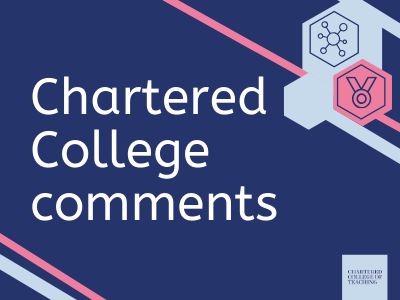CHARTERED COLLEGE COMMENTS ON NEW EARLY LEARNING GOALS
Today (22 June) the Department of Education has announced its new Early Learning Goals.
Professor Dame Alison Peacock, Chief Executive of the Chartered College of Teaching, has commented on the changes:
“As a strong advocate of early education with extensive experience working as a headteacher of a primary school with nursery, I know that early years education has a profound and lasting influence on a child’s development. While strong early years education has immediate short-term benefits, it also has far reaching long term impacts on social skills, behaviour and future life chances.
At the Chartered College of Teaching, we want to ensure that all teachers – including early years teachers – can work in the most effective, informed way to ensure they deliver the strongest possible education for children and young people now and into the future.
With early years being such an important time in a child’s development, the Early Years Review and recommendations must support teachers in providing the best possible environment, experience and opportunities for children to learn. A key part of this should be to maximise the time that teachers have to interact meaningfully with children by easing workload burdens. It is good to see that ideas are being piloted, this means options can be properly tested with the profession – and evaluated by the Education Endowment Foundation – so that decisions are driven by the evidence of what works.
As part of our work to support early years professionals, ranging from our Early Years Network to our recent research into early years life chances as part of the Life Chances inquiry we seek to build expertise and ensure that the evidence, voices and concerns of those working in the early years sector are heard.
We are also looking at how else we can support teachers working in early years to benefit from the evidence and research that exists to understand children’s development and learning, champion great teaching and raise the status of the teaching profession.”
